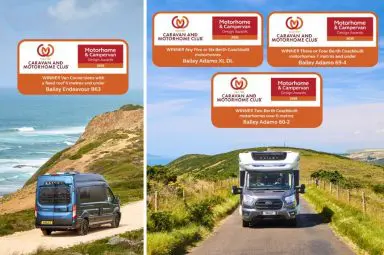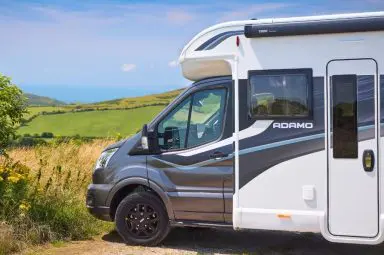Eco-Friendly Campervan Travel Tips
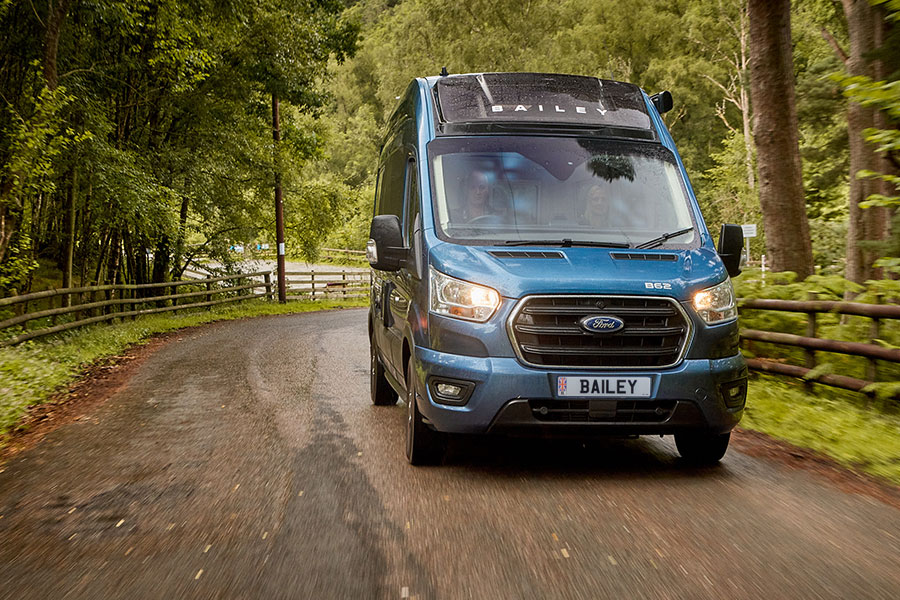
Campervans can also help you explore the countryside in both the UK and abroad in a way that staying in a hotel would not, allowing you to get closer to nature.
Plus, at Bailey, our Endeavour campervans are 75% recyclable at the end of life, so you can be sure that your holiday will remain the environmentally friendly choice.
If you’re aiming for an eco camping trip to minimise your impact on nature as much as possible, this article will give you some helpful tips and tricks to enjoy your holiday at the same time as safeguarding our planet.
What is eco-friendly camping?
Eco-friendly camping trips are a way of holidaying that follows the ‘Take only photographs, leave only footprints’ ethos.
This leave no trace ethos was first created in July 1954 when an article published in a Missouri newspaper regarding the Bandelier National Monument in New Mexico mentioned visitors should: “Take nothing but pictures, leave nothing but footprints”.
Since then, variations of the saying have been used across all manner of tourist sites, and it’s a mantra that has become synonymous with environmentally friendly travel.
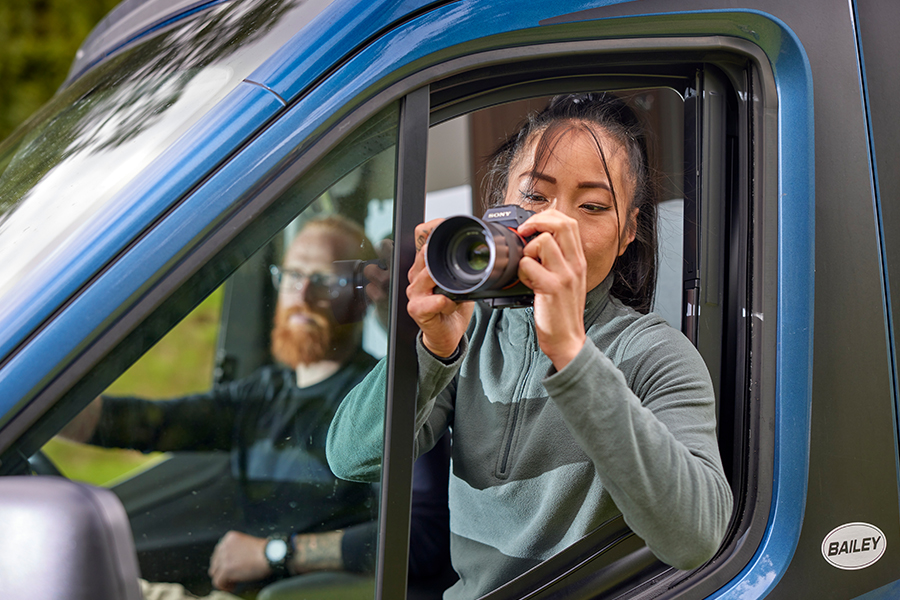
While the mantra is easy to understand on its surface, it encompasses several principles. These include:
- Leave what you find: Don’t remove any natural or historic items from the place you’re visiting because they all contribute to its ecosystem or archaeological significance.
- Don’t alter anything: Don’t try to build new structures, chop down trees or remove branches from any place you visit because this can upset the natural balance.
- Preserve cultural & historic sites: You can look at but don’t touch anything historical because it can make them erode more quickly.
- Don’t introduce non-native species: Non-native species can destroy local wildlife. And remember, seeds can grow into problem plants. So make sure you always clean your boots and vehicles before travelling to a foreign destination to reduce the risk of contamination.
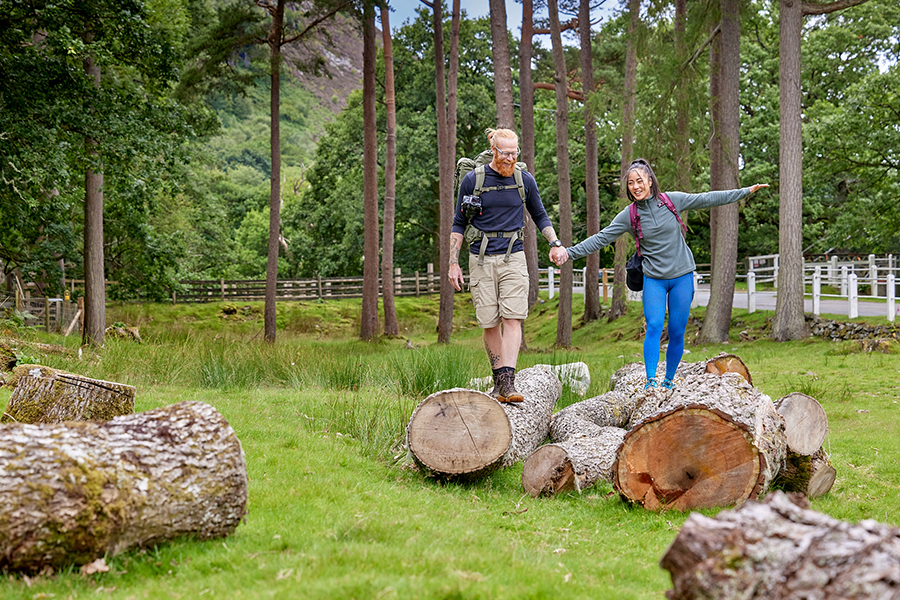
What are the benefits of eco-friendly camping in a campervan?
Choosing to travel in a campervan over other modes of transport, such as flying, can have a dramatically positive impact on the eco-friendly nature of your holiday. Here are some of the benefits you can expect to see when campervanning:
Reduced carbon emissions
For example, research by The National Caravan Council shows that a 1,000+ mile trip from London to the north of Scotland with a family of four in a small saloon car towing a caravan generates just 38% of the CO² emissions (0.36 tonnes) compared to flying the same distance, which produces nearly a ton of CO² (0.96 tonnes).
Reduced waste in the creation of your vehicle
As a campervan manufacturer committed to our planet, at Bailey, we make sure to recycle as much material as possible when creating your vehicle. Our partnership with a local waste management company helps us to split the following into separate groups for recycling:
- Timber
- Aluminium
- Ferrous metal
- Polystyrene
- Vinyl
- Paper
- Cardboard
- Plastic
- Foodstuffs
Annually, this saves 720 tonnes of waste from landfill – the equivalent weight of 480 caravans or 205 motorhomes!
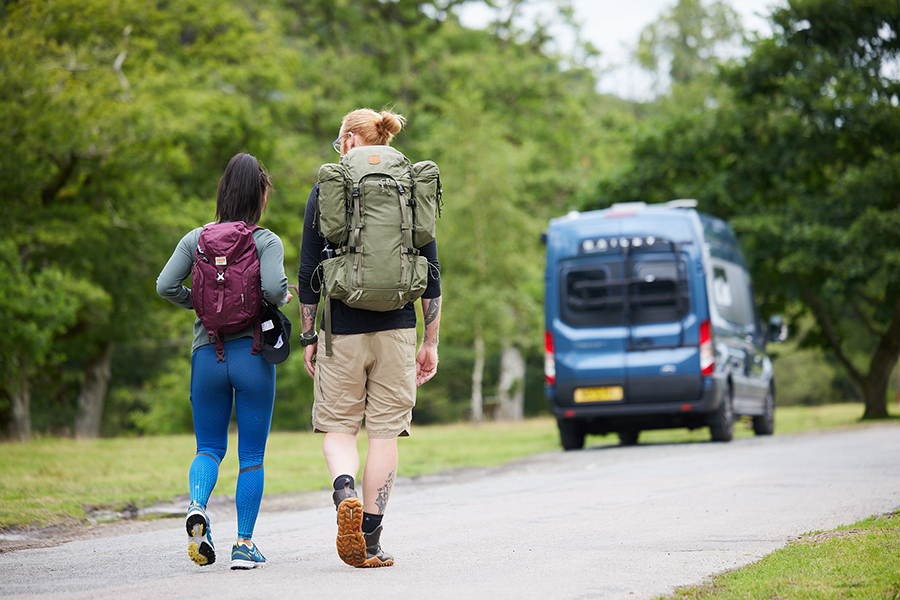
What are some eco-friendly practices you can adopt when campervanning?
The eco-friendly practices need not stop at simply booking a campervan holiday. If you want to, here are some extra steps you can take to ensure your holiday is as green or close to nature as possible.
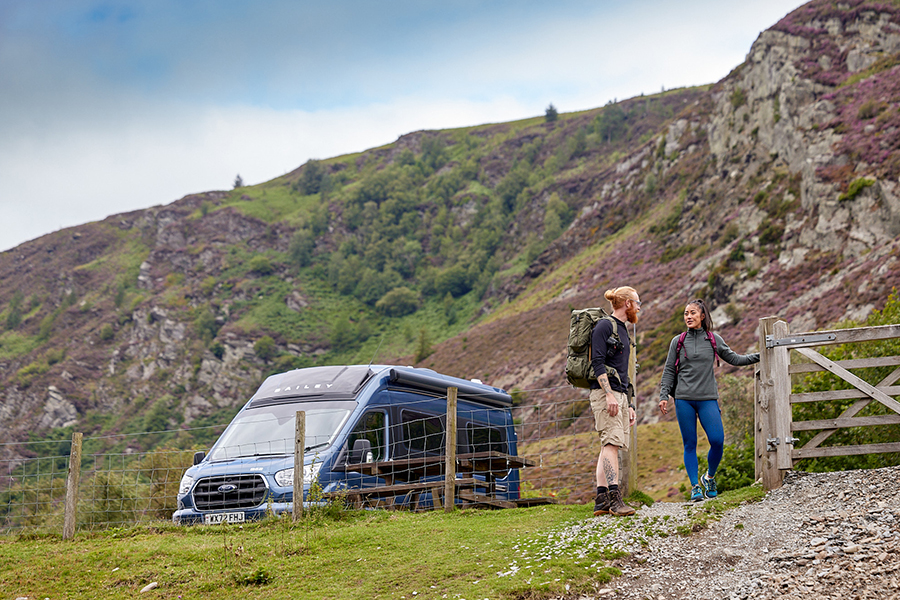
1. Camp near nature reserves
There are many camping opportunities available close to nature reserves.
If you’d like to find a campsite within one of the reserves, look to book through one of the UK’s main clubs because they guarantee the campsite you stay on is run to a certain standard.
You could consider finding a campsite through:
2. Volunteer with conservation efforts
If you choose to stay on or near a nature reserve, you could look to join local conservation efforts during your stay. Volunteers are often asked to help with activities such as:
- Tree planting
- Plastic tree guard removal
- Protecting rare nest sites
- Restoring habitats
- Monitoring wildlife
- Running social media
- Event organisation & support
- Supporting with any specialised skills you may have
To find out more and discover volunteering opportunities near where you’re staying, have a look at the website of your local Wildlife Trust.
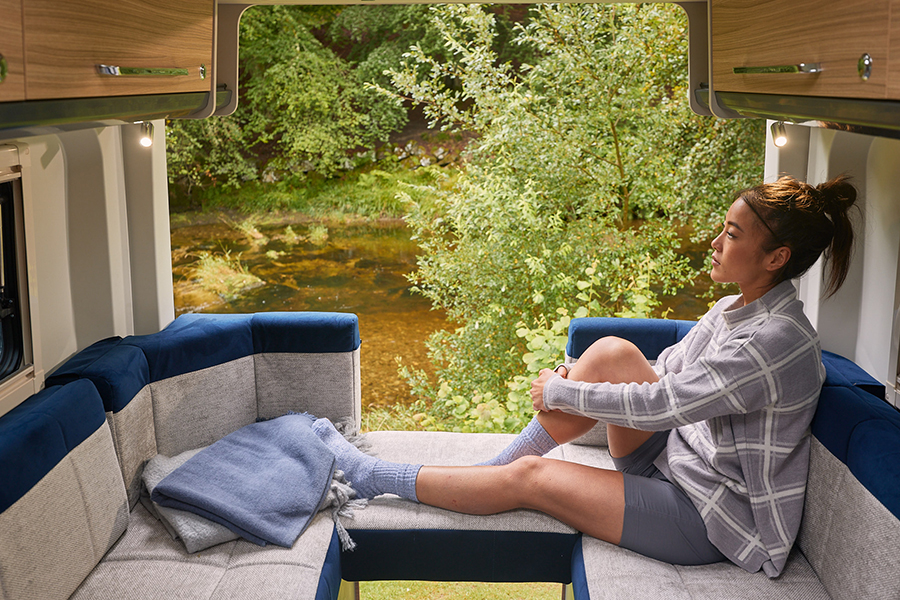
3. Consider offsetting your carbon footprint
As we’ve already discussed, simply choosing to go on a campervan holiday rather than flying already makes a huge positive difference in the amount of carbon you’re creating.
However, if you’d like to go a step further, here are some things you could consider doing while on holiday:
- Donate to tree planting organisations: You could donate money to charities like Ecologi, which offset carbon emissions by tree planting and investing in wind energy generation and hydropower operations.
- Don’t go so far: You could reduce the amount of energy you consume to travel by not going quite so far during your trip. For example, if you live in Bristol, you might look to go down to Devon or Cornwall rather than all the way up to Scotland.
- Cycle & use public transport where possible: When you get to your destination, consider driving as little as possible. Instead, opt to walk, cycle or get some form of public transport to explore your local area.
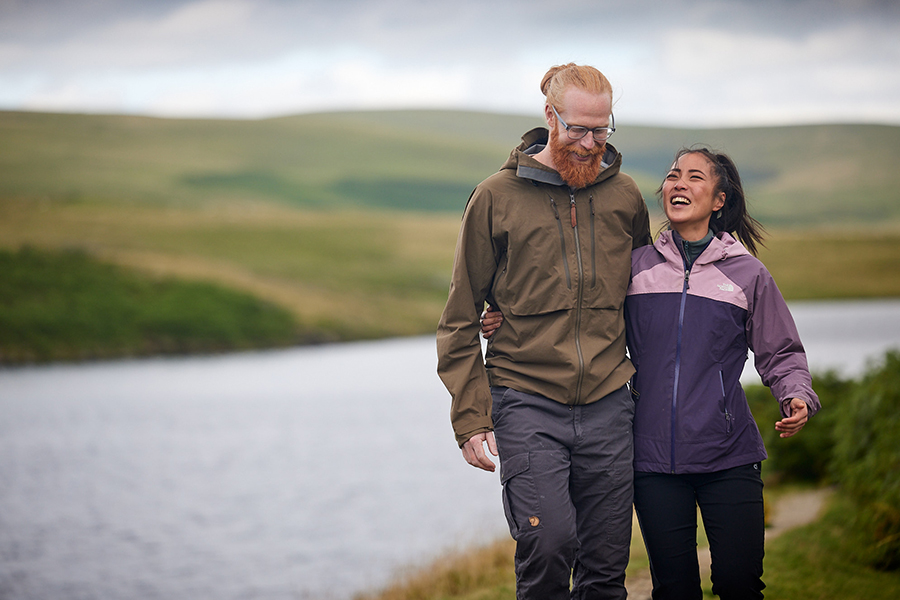
4. Reduce your waste
One of the best ways to make your holiday greener is to reduce the amount of waste you create where possible. You already recycle at home, so why not during your stay?
Some of the things you could consider doing to reduce your waste creation are:
- Using reusable items (e.g. water bottles, food containers, shopping bags)
- Using your campsite recycling facilities (where possible)
- Avoiding single-use plastics
- Choosing eco-friendly products (e.g. shampoo, conditioner, washing up liquid)
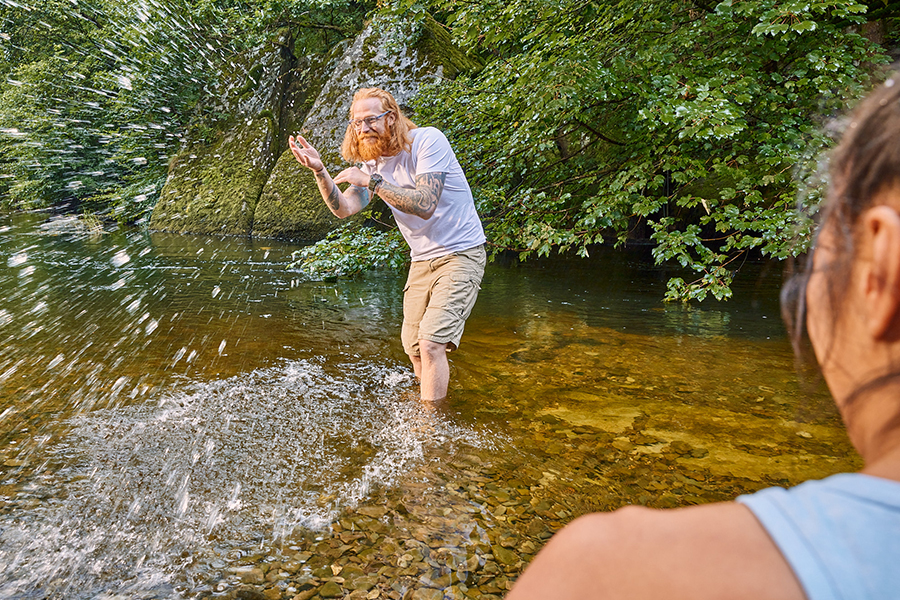
5. Reduce your water usage
At home, you likely turn the tap off when brushing your teeth to reduce water usage, so you’ll also likely already be doing that on holiday. Here are some other useful tips for reducing your water usage while away:
Use fixtures that reduce the flow: Eco-friendly bathroom and kitchen fixtures can reduce the water flow, thus reducing your water consumption by up to 50%. One great example is this eco-friendly showerhead available from Prima Leisure.
6. Reduce energy consumption where possible
Much like at home, one of the best ways to remain green is to reduce your energy consumption as much as possible. This means switching off gas and electrical items when you’re not using them and reducing the number of lights on at one time.
Another great tip is to use renewable energy in the form of solar power where possible to reduce your reliance on fossil fuels and thus reduce your impact on the environment.
The Bailey Endeavour campervans are designed to help you continue using eco-friendly sources of power, even when off-grid. Each one comes with a Truma 100-watt solar panel and 105 Ah AGM leisure battery, so you can use the power of the sun to charge your devices and gadgets while on the road.
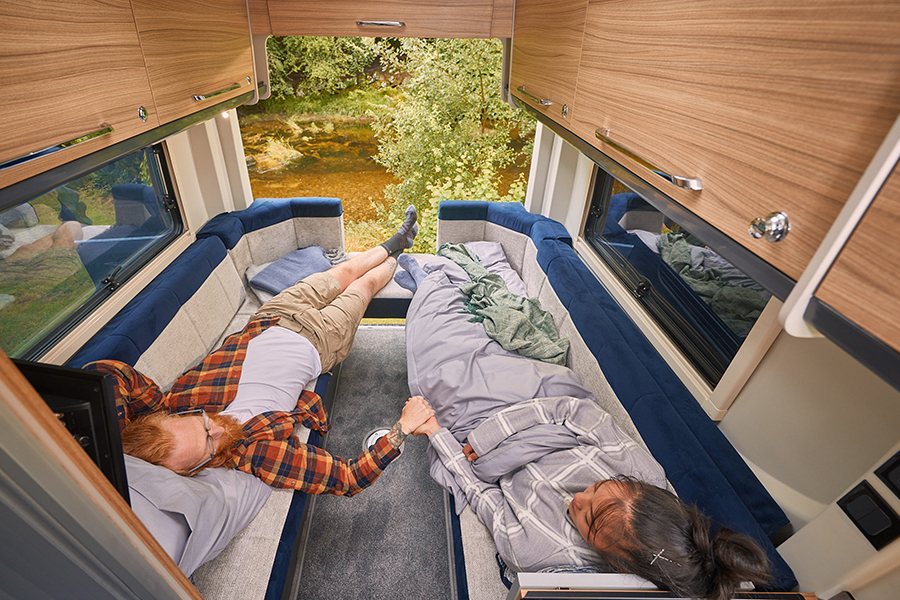
7. Take less camping gear by packing lightly
The heavier a vehicle is, the more fuel it uses to get to its destination.
Therefore, the lighter you pack, the more fuel you’ll save.
Some weight-saving tips include:
- Don’t travel with full water tanks
- Take fewer clothes and personal items with you
- Remove any fittings you’re not planning to use (e.g. bike racks, satellite dishes and gas cylinders)
- Use lighter kitchen utensils (e.g. consider purchasing space saving utensils and ones made from long-lasting plastic)
8. Buy Local
When you get to your destination, consider purchasing supplies from local stores. Local stores often don’t have huge warehouses or logistics operations, so they avoid the hefty energy consumption of bigger brands. Thus meaning, whatever you purchase has likely contributed less carbon to the planet during its creation.
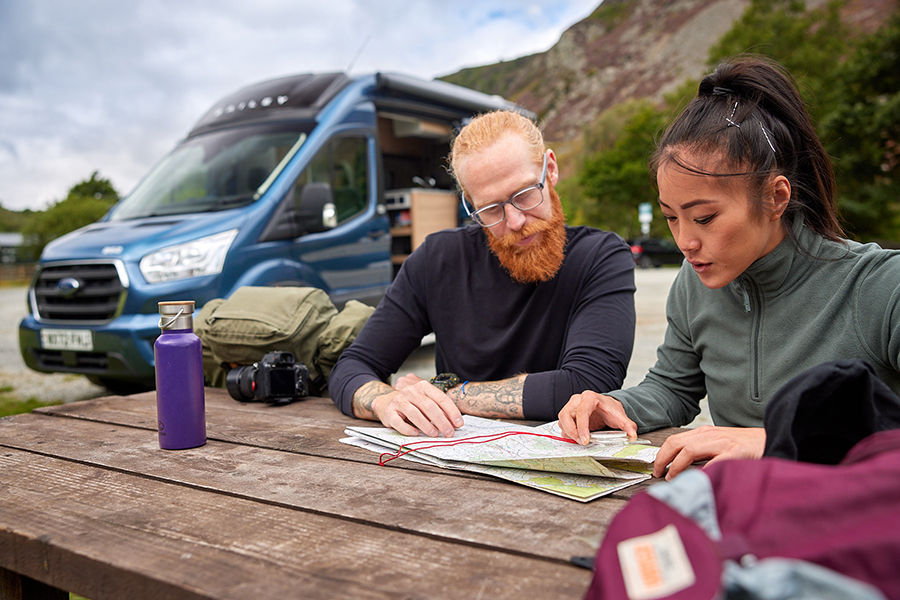
Travel greener with the Bailey Endeavour
Aiming for more eco-friendly campervan travel offers the perfect blend of adventure and sustainability. From cutting carbon emissions and reducing waste to embracing conservation efforts and supporting local communities, every small step you take makes a big difference.
With Bailey’s commitment to sustainable practices, including recyclable vehicles and partnerships with organisations like the Woodland Trust, you can be confident that your holiday choice aligns with protecting our planet.
By incorporating the tips shared in this article, you can make your next campervan trip even greener, proving that unforgettable adventures and environmental responsibility go hand in hand.
Discover the Bailey Endeavour and see our range of campervans.
Latest news & events
See all news & eventsWinchester Caravans & Motorhomes Caravan, Motorhome and Awning Spring Spectacular
COLDEN COMMON, MAIN ROAD, WINCHESTER
Stowford Leisure (Devon) Spring Open Weekend & Awning Show
STOWFORD LEISURE (DEVON), A361 WEST DOWN, ILFRACOMBE, DEVON
